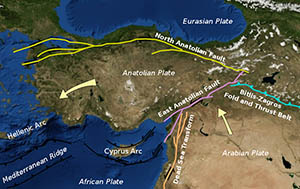Earthquake in Turkey: economic consequences
The economic consequences of the two earthquakes in Turkey are considerable, with a significant impact on the country's economy. However, the total cost of the disaster will not be known for several years.
Earthquake in Turkey: direct material cost
 According to an initial estimate of the damage, carried out by the World Bank, the direct material damage of the earthquake is likely to amount to 34.2 billion USD, or 4% of Turkey's GDP.
According to an initial estimate of the damage, carried out by the World Bank, the direct material damage of the earthquake is likely to amount to 34.2 billion USD, or 4% of Turkey's GDP.
This estimate, which may reach up to 40.7 billion USD, does not include the indirect impact of the destruction on the country's economic activity, nor does it relate to the cost of reconstruction which could be two to three times higher.
Other international risk assessment institutions such as Moody's RMS, Verisk or Karen Clark & Company (KCC) have envisaged more conservative estimates with material losses ranging between 20 and 25 billion USD.
NB: in mid-March 2023, the World Bank estimates the cost of material damage at 100 billion USD.
Earthquake in Turkey: reconstruction cost
According to the Turkish Enterprise and Business Confederation (TEBC), rebuilding the damaged buildings and infrastructure damaged by the earthquake could cost between 50 to 85 billion USD.
The area to be rebuilt covers 110 000 km2, populated by 13 million people. The authorities have announced the start of construction of 30 000 residential buildings in the disaster area in March 2023.
Read also | Earthquake in Turkey: impact on insurance
Earthquake in Turkey: cost sustained by the State budget
According to TEBC estimates, the State budget would bear a deficit of 10.4 billion USD while the loss of labor in the affected areas would set the national economy back 2.9 billion USD. The areas destroyed by the earthquake rank high in the country's economy. They account for:
- nearly 12% of the country's GDP,
- about 20% of agricultural and forestry production,
- 10% of manufacturing production,
- nearly 15% of construction activity.
With the stoppage of production and the total or partial destruction of several factories, sectors such as textiles, clothing, retail, agri-food, services, etc. will be heavily impacted by the natural disaster.
In the short term, the consequences on the local economy, already weakened by the fall of the Turkish lira and inflation (+83.4% in September 2022), will be terrible.
Given the extent of the damage, the country's growth is expected to slow down sharply. During the Izmit earthquake (100 km east of Istanbul) in 1999, GDP declined by 3.3% before rebounding to 6.8% in 2000. More than 40% of the Turkish industry was then affected by the earthquake.
As an emergency response, the Turkish central bank lowered its key interest rate to boost employment, support industrial production and stimulate growth.
